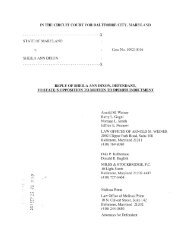Reply Memo in Support of Motion to Quash Grand Jury Subpoenas
Reply Memo in Support of Motion to Quash Grand Jury Subpoenas
Reply Memo in Support of Motion to Quash Grand Jury Subpoenas
You also want an ePaper? Increase the reach of your titles
YUMPU automatically turns print PDFs into web optimized ePapers that Google loves.
f<strong>in</strong>d<strong>in</strong>g <strong>of</strong> grand jury abuse, one appropriate sanction would be suppression <strong>of</strong> any<br />
evidence derived from the improperly issued subpoenas. Id. at 629.<br />
While Rule 6( e) <strong>of</strong> the Federal Rules <strong>of</strong> Crim<strong>in</strong>al Procedure govern<strong>in</strong>g grand jur<br />
secrecy is perhaps even more str<strong>in</strong>gent than Marland Rule 4-643, the numerous federal<br />
cases <strong>in</strong> which the issue <strong>of</strong> abuse <strong>of</strong> the grand jur process has arisen have also been<br />
considered by the trial judge <strong>in</strong> the context <strong>of</strong> the case under <strong>in</strong>dictment. See, e.g. United<br />
States v. Moss, 756 F.2d 329, 331 (4th Cir. 1985); United States v. Flemmi, 245 F.3d 24<br />
(l st Cir. 2001); United States v. Kovaleski, 406 F .Supp. 267 (E.D. Mich. 1976); United<br />
States v. Zaratt<strong>in</strong>i, 552 F.2d 753 (7th Cir. 1977); United States v. Woods, 544 F.2d 242<br />
(6th Cir. 1976); United States v. Sellaro, 514 F.2d 114 (8th Cir. 1973); United States v.<br />
Gibbons, 607 F.2d 1320 (loth Cir. 1979).2<br />
The State also questions the defendant's stand<strong>in</strong>g <strong>to</strong> raise these issues, and<br />
whether they are "ripe" for consideration. Response at 2. As the above cases, <strong>in</strong>clud<strong>in</strong>g<br />
Erman, make abundantly clear, the prosecu<strong>to</strong>r's misuse <strong>of</strong> the grand jury process affects<br />
the defendant's rights <strong>to</strong> due process and a fair trial, which is why courts have considered<br />
the issues under similar circumstances. See, e.g., United States v. Woods, supra at 250<br />
(address<strong>in</strong>g merits <strong>of</strong> defendant's grand jury abuse arguments <strong>in</strong> spite <strong>of</strong> governent's<br />
contention that defendant lacked stand<strong>in</strong>g.)<br />
F<strong>in</strong>ally, the Court should reject the State's suggestion <strong>of</strong> mootness. The Court<br />
should not permit the State <strong>to</strong> conceal other potential similar violations merely by<br />
withdraw<strong>in</strong>g those improper subpoenas which have surfaced. Even if the Cour<br />
concludes that the rules govern<strong>in</strong>g crim<strong>in</strong>al <strong>in</strong>vestigations applies, the defendant has<br />
2 Of course, the proper mechanism for fi<strong>in</strong>g the <strong>in</strong>stant motion has absolutely no bear<strong>in</strong>g on its merits, nor<br />
should it affect the Court's determ<strong>in</strong>ation <strong>of</strong> the appropriate relief <strong>to</strong> be granted.<br />
5

















